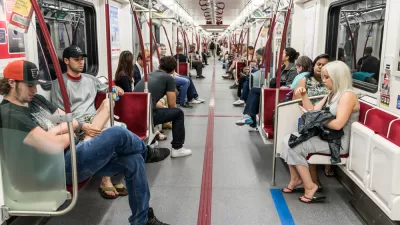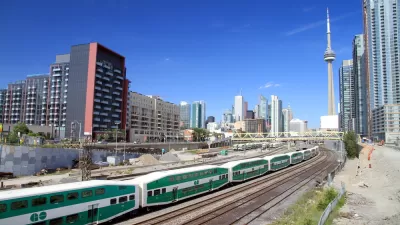A new report documents the tremendous growth of Toronto's core, as it outpaces the surrounding suburbs. Downtown's growth is welcome news, but it won't come without substantial challenges.
'Echo Boomers' - those born between 1972 and 1992 - are flocking to Toronto's core, tripling downtown's growth rate in just five years according to a new report, entitled “Toronto — A Return to the Core" [PDF] by TD Economics. "This runs counter to worry over the 'doughnut effect' — a fear that Toronto will steadily lose jobs and dynamism to the regions that surround it — making this city the empty hole in a GTA doughnut," says an editorial in The Toronto Star.
Yet, as the report notes, this growth brings with it substantial challenges that must be addressed by city leaders and planners. "The eager young urbanites crowding into the core rely heavily on public transit, and a continued downtown population surge could overwhelm the city’s already struggling system."
"It’s also clear that the downtown is fast becoming a 'neighbourhood' in the full meaning of the word. And no neighbourhood benefits from having a casino plopped down in its centre," says the editorial in regards to a proposal by Oxford Properties Group to build a casino as part of a massive redevelopment project.
"It’s not clear how long the Echo Boomer influx will last. As they get older and have children they might head off to the suburbs, just like their parents. Those parents, in turn, may go the other way, abandoning their empty nests and moving into a condo in the core. Either way, it’s vital that city builders get it right by providing more transit and other amenities so that more people — regardless of age — can keep our downtown booming."
FULL STORY: ‘Echo Boomers’ revitalize Toronto’s downtown core: Editorial

Alabama: Trump Terminates Settlements for Black Communities Harmed By Raw Sewage
Trump deemed the landmark civil rights agreement “illegal DEI and environmental justice policy.”

Study: Maui’s Plan to Convert Vacation Rentals to Long-Term Housing Could Cause Nearly $1 Billion Economic Loss
The plan would reduce visitor accommodation by 25% resulting in 1,900 jobs lost.

Why Should We Subsidize Public Transportation?
Many public transit agencies face financial stress due to rising costs, declining fare revenue, and declining subsidies. Transit advocates must provide a strong business case for increasing public transit funding.

Wind Energy on the Rise Despite Federal Policy Reversal
The Trump administration is revoking federal support for renewable energy, but demand for new projects continues unabated.

Passengers Flock to Caltrain After Electrification
The new electric trains are running faster and more reliably, leading to strong ridership growth on the Bay Area rail system.

Texas Churches Rally Behind ‘Yes in God’s Back Yard’ Legislation
Religious leaders want the state to reduce zoning regulations to streamline leasing church-owned land to housing developers.
Urban Design for Planners 1: Software Tools
This six-course series explores essential urban design concepts using open source software and equips planners with the tools they need to participate fully in the urban design process.
Planning for Universal Design
Learn the tools for implementing Universal Design in planning regulations.
Caltrans
Smith Gee Studio
Institute for Housing and Urban Development Studies (IHS)
City of Grandview
Harvard GSD Executive Education
Toledo-Lucas County Plan Commissions
Salt Lake City
NYU Wagner Graduate School of Public Service





























